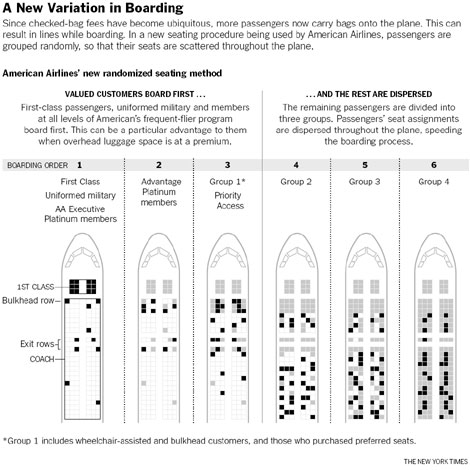Worse than security lines? Airlines try new boarding schemes
Updated: 2011-11-13 07:00
By Jad Mouawad(The New York Times)
|
|||||||
As airlines have added new classes of seating and new fees for priority boarding - all in the name of more revenue - they have made the boarding process frustratingly slow.
Boarding time has doubled over the last decades, according to research by Boeing. It now takes 30 to 40 minutes to board about 140 passengers, up from around 15 minutes in the 1970s.
"They should have a different line for people with carry-ons like they do at baseball games with bags," said Brian Proffit, who was flying to Houston from New York with Delta Air Lines. "The boarding process has become worse than the security lanes."
Checked-baggage fees are a problem, because travelers now take more roll-ons onboard. This blocks the aisles as people try to store their bags.
Spirit Airlines found that passengers got to their seats faster once it started charging $20 to $40 per carry-on bag. Since it's $2 cheaper to check a bag, more passengers do, and Spirit claims its "stress-free boarding" saves six minutes on average.
It should be no surprise that boarding has become one more frustrating step in airline travel. Or, as Mark E. DuPont, the vice president for airport services planning at American Airlines, put it: "Boarding can be like driving behind a slow-moving truck that you can't overtake."
Airlines have tried several methods to speed up their boarding. Some board passengers in the back rows first, while others give priority to those with window seats.
American Airlines changed its boarding method in May. It still gives priority to business passengers and frequent fliers but then boards passengers who paid an extra $9 to $19 to get on early, guaranteeing they will find space to stow bags. The rest of the passengers are then brought in as three groups, sorted in an attempt to spread them out more evenly through the cabin.
The approach also helps passengers stow luggage more efficiently, nearer to their seats, allowing more people to find overhead space and cutting the number of bags that need to be checked at the last minute - a common cause of delayed flights. The new method has cut boarding by four to five minutes.
All the extra fees have been a boon to the airlines' bottom lines. According to estimates by Amadeus, a global distribution service, they will add up to $12.5 billion in 2011 for major airlines in the United States, up 87 percent from last year.
"Overhead space has really become a premium product," said Kerry Hester, the senior vice president for operations planning at US Airways.
Another approach to boarding is used by Southwest Airlines, which says it can board its planes in around 15 minutes. It says the root of the delays is the practice of assigning seat numbers. Southwest's passengers are instead assigned to one of three boarding groups, and then given a number based on their check-in time.
Passengers who buy a premium "Business Select" ticket are guaranteed to board ahead of everyone, followed by Southwest frequent fliers and passengers who bought a one-way "early-bird check-in" pass for $10.
The airlines, meanwhile, keep looking for what Scott O'Leary, managing director of customer experience at United, described as "the sweet spot between speed and a sense of order."
The New York Times

(China Daily 11/13/2011 page10)